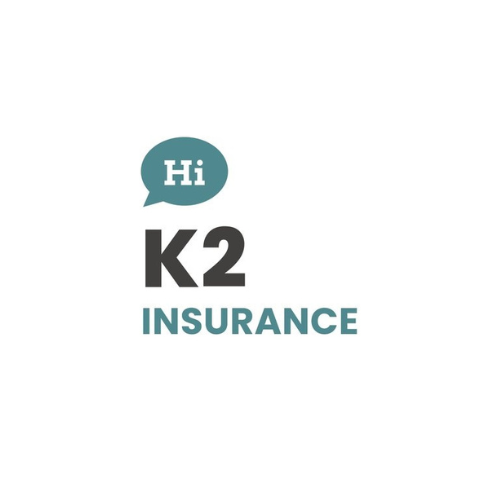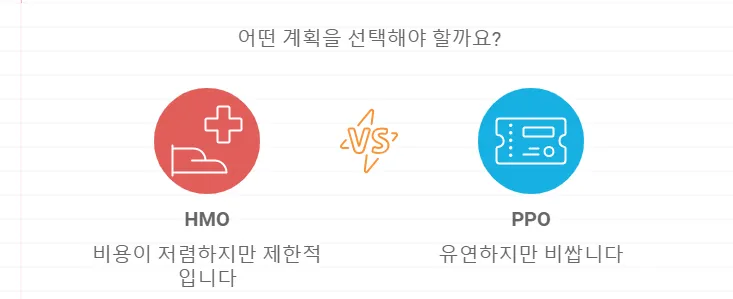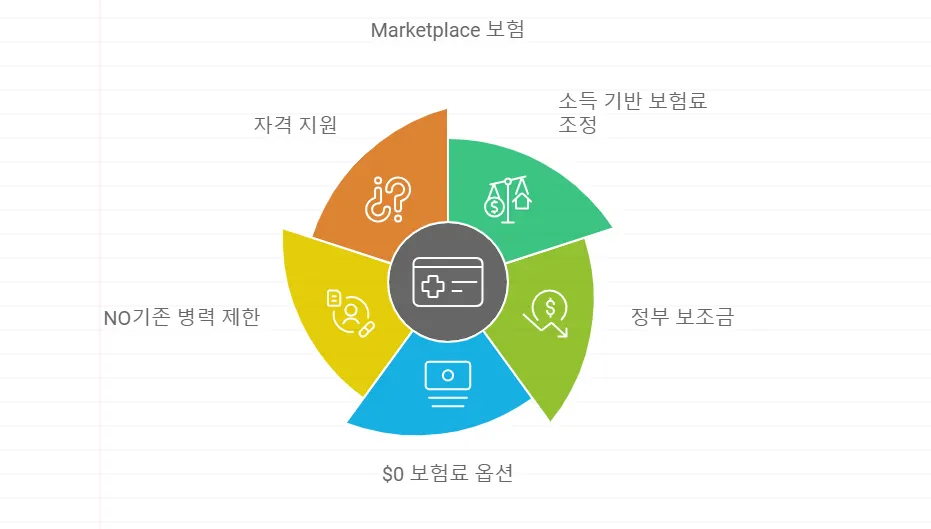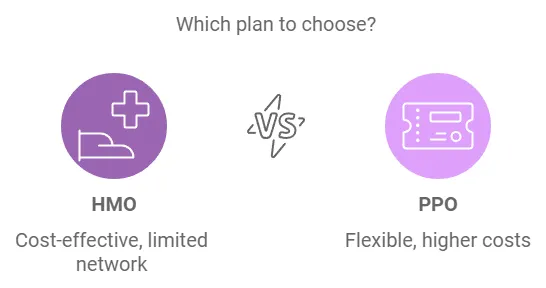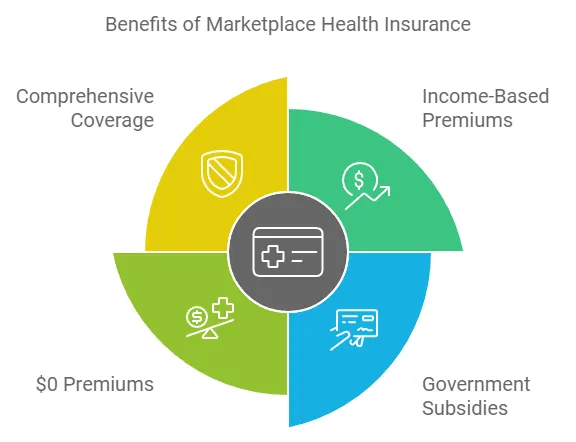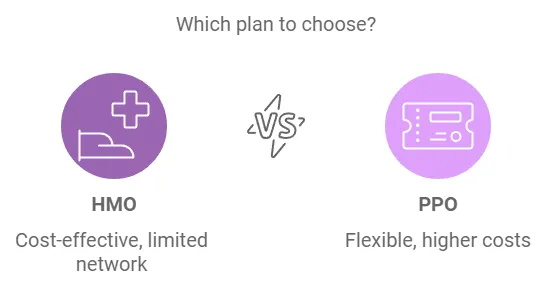미국 건강보험, 가입기간이 있습니다.
건강보험 가입 기간
미국 건강보험은 가입 기간이 따로 있습니다. 1월 1일부터 보험 혜택을 시작하려면 매년 11월 1일부터 12월 15일까지 가입해야 하고, 2월 1일부터 보험 혜택을 시작하려면 1월 15일까지 가입해야 합니다.
이 기간을 오픈 가입 기간(Open Enrollment Period, OEP)이라 하며, 이 기간 동안만 보험 가입이 가능합니다. 건강보험은 크게 On-Market(Marketplace)와 Off-Market(비공식 시장)으로 나뉘며, 두 경우 모두 이 기간 안에 가입해야 합니다.
다만, 특별 가입 조건(SEP: Special Enrollment Period) 에 해당하는 경우에는 오픈 가입 기간이 아니어도 가입이 가능합니다. SEP는 이사, 출산, 결혼, 실직 등 특별한 상황에 해당할 때 주어집니다.
보험의 종류
미국 건강보험은 주로 다음과 같은 유형이 있습니다:
•
HMO (Health Maintenance Organization): 네트워크 내의 병원과 의사만 이용 가능하며, 주치의(Primary Care Physician)를 통해 진료를 받아야 합니다. 비용이 저렴하지만 네트워크 외 진료 시 보험 혜택이 없습니다.
•
PPO (Preferred Provider Organization): 네트워크 내외 모두 이용 가능하며, 주치의 없이 자유롭게 전문의를 만날 수 있습니다. 유연성이 높지만, 프리미엄이 비싸고 네트워크 외 진료 시 추가 비용이 발생할 수 있습니다.
•
EPO (Exclusive Provider Organization): 네트워크 내에서만 진료가 가능하나, 주치의 없이 바로 전문의를 만날 수 있습니다. PPO보다 프리미엄이 저렴하지만 네트워크 외 진료는 전혀 커버되지 않습니다.
건강보험이 커버하는 내용
보험이 커버하는 항목은 보통 다음과 같습니다.
•
의사 방문 및 치료: 기본적인 진료, 입원, 수술 등.
•
예방 서비스: 정기 건강검진, 예방접종, 암 검진 등.
•
응급 치료: 응급실 이용, 응급 상황 시 응급 의료 서비스.
•
처방약: 각 보험 플랜에 따라 다르게 커버.
•
정신 건강 서비스: 상담, 치료, 입원 등 정신 건강 관련 서비스.
건강보험이 커버하지 않는 내용
모든 건강보험이 커버하지 않는 항목도 있습니다.
•
미용 및 성형 수술: 의학적으로 필요하지 않은 경우.
•
대체 요법: 침술, 한방 치료 등 일부 대체 의학.
•
장기 요양 서비스: 요양원 비용 등 장기 요양이 필요한 경우.
•
치과 치료: 일반 건강보험은 치과 치료를 커버하지 않으며, 치과 보험은 별도로 가입해야 합니다.
•
해외 치료: 해외에서 발생한 의료비는 일반적으로 커버되지 않으므로, 해외 여행 시에는 별도의 여행자 보험을 가입해야 합니다.
보험이 없는 경우 어떻게 될까?
보험이 없는 상태에서 의료 서비스를 이용하면 큰 재정적 부담을 질 수 있습니다. 예를 들어, 응급실 방문 시 수천 달러가 청구될 수 있으며, 중대한 수술이나 장기 입원 치료의 경우에는 수만 달러에서 수십만 달러까지 비용이 발생할 수 있습니다. 건강보험이 없다면 의료비 청구로 인해 심각한 경제적 어려움을 겪을 수 있으므로, 건강보험 가입은 필수입니다.
Marketplace 보험의 장점
Marketplace(건강보험 거래소) 보험의 주요 장점은 소득에 따라 보험료가 조정된다는 것입니다. 소득이 낮은 경우 정부 보조금을 통해 보험료를 절감할 수 있으며, 일부는 $0 보험료로도 가입할 수 있습니다. 이는 보험 혜택을 많이 받을 수 있는 좋은 기회가 됩니다.
자격이 되는지 알고 싶다면 언제든지 문의해주세요! 건강보험 선택은 여러분의 건강과 재정을 지키는 중요한 결정이므로, 저희가 도와드리겠습니다.
상담신청 form (monday lead form link 연결)
직접 견적하기 (health sherpa link 연결)
There is an enrollment period for U.S. health insurance.
Health Insurance Enrollment Period
There is a specific enrollment period for U.S. health insurance. If you want your insurance benefits to start on January 1st, you must enroll between November 1st and December 15th of the previous year. If you want benefits to start on February 1st, you must enroll by January 15th.
This period is called the Open Enrollment Period (OEP), and you can only sign up for health insurance during this time. Health insurance is generally divided into On-Market (Marketplace) and Off-Market (non-official market) categories, and in both cases, you must enroll within this period.
However, if you qualify for the Special Enrollment Period (SEP), you can enroll outside the open enrollment period. SEP is granted in special circumstances, such as moving, childbirth, marriage, or job loss.
Types of Insurance
The main types of U.S. health insurance are:
•
HMO (Health Maintenance Organization): You can only use doctors and hospitals within the network, and you must receive care through a Primary Care Physician. It is cost-effective but does not cover out-of-network services.
•
PPO (Preferred Provider Organization): You can use both in-network and out-of-network services and see specialists without a referral. It offers flexibility, but premiums are higher, and out-of-network services may have additional costs.
•
EPO (Exclusive Provider Organization): You can only receive care within the network but can see specialists without a referral. Premiums are lower than PPOs, but out-of-network services are not covered at all.
What Health Insurance Covers
Insurance typically covers the following:
•
Doctor visits and treatment: Basic care, hospitalization, surgery, etc.
•
Preventive services: Regular health check-ups, vaccinations, cancer screenings, etc.
•
Emergency care: Emergency room visits and services in urgent situations.
•
Prescription drugs: Coverage varies depending on the insurance plan.
•
Mental health services: Counseling, treatment, hospitalization, and other mental health-related services.
What Health Insurance Does Not Cover
There are some services that health insurance does not typically cover:
•
Cosmetic surgery: Unless medically necessary.
•
Alternative therapies: Acupuncture, herbal medicine, and other alternative treatments may not be covered.
•
Long-term care services: Costs for nursing homes or long-term care are generally not covered.
•
Dental care: General health insurance does not cover dental treatment, and dental insurance must be purchased separately.
•
Overseas treatment: Medical expenses incurred abroad are usually not covered, so separate travel insurance is recommended for overseas trips.
What Happens If You Don’t Have Insurance?
Without insurance, medical services can become a significant financial burden. For example, an emergency room visit can cost thousands of dollars, and major surgeries or extended hospital stays can cost tens to hundreds of thousands of dollars. Without health insurance, these bills could lead to severe financial hardship, making health insurance essential.
Benefits of Marketplace Insurance
One of the key advantages of Marketplace health insurance is that premiums are adjusted based on income. If your income is low, you can reduce your premiums through government subsidies, and some people may even qualify for $0 premiums. This makes it an excellent opportunity to receive comprehensive insurance coverage.
If you'd like to know if you qualify, feel free to contact us! Choosing the right health insurance is an important decision for protecting your health and finances, and we’re here to help.
Consultation Request Form (Link to monday lead form)
Get a Quote Yourself (Link to HealthSherpa)
Health Insurance Enrollment Period
This period is called the Open Enrollment Period (OEP), and you can only sign up for health insurance during this time. Health insurance is generally divided into On-Market (Marketplace) and Off-Market (non-official market) categories, and in both cases, you must enroll within this period.
However, if you qualify for the Special Enrollment Period (SEP), you can enroll outside the open enrollment period. SEP is granted in special circumstances, such as moving, childbirth, marriage, or job loss.
Types of Insurance
•
HMO (Health Maintenance Organization): You can only use doctors and hospitals within the network, and you must receive care through a Primary Care Physician. It is cost-effective but does not cover out-of-network services.
•
PPO (Preferred Provider Organization): You can use both in-network and out-of-network services and see specialists without a referral. It offers flexibility, but premiums are higher, and out-of-network services may have additional costs.
•
EPO (Exclusive Provider Organization): You can only receive care within the network but can see specialists without a referral. Premiums are lower than PPOs, but out-of-network services are not covered at all.
What Health Insurance Covers
Insurance typically covers the following:
•
Doctor visits and treatment: Basic care, hospitalization, surgery, etc.
•
Preventive services: Regular health check-ups, vaccinations, cancer screenings, etc.
•
Emergency care: Emergency room visits and services in urgent situations.
•
Prescription drugs: Coverage varies depending on the insurance plan.
•
Mental health services: Counseling, treatment, hospitalization, and other mental health-related services.
What Health Insurance Does Not Cover
There are some services that health insurance does not typically cover:
